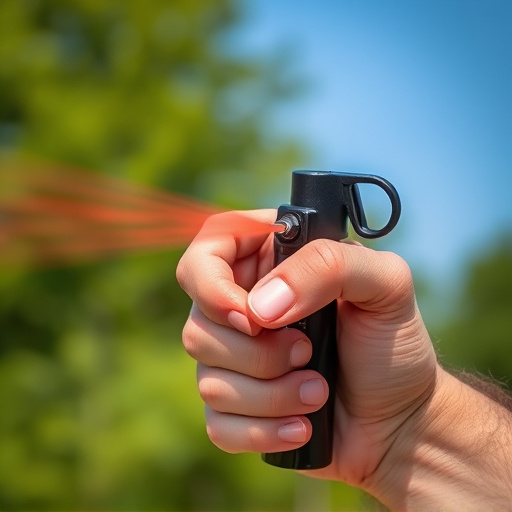Storing pepper spray at home demands a balanced approach: securing it from unauthorized access while ensuring quick emergency retrieval. Keep it in cool, dry conditions away from sunlight and heat sources, and store in a sealed container to prevent leakage. Store it in a locked drawer or cabinet, practice regular inspections for damage, and educate all household members about its location and usage rules. Comply with local laws regarding ownership and understand insurance implications before using pepper spray for self-defense.
“Staying safe is a top priority, especially with readily available self-defense weapons like pepper spray. This versatile tool can provide crucial protection during emergencies, but proper knowledge and handling are essential. From understanding its powerful yet limited effects to navigating legal aspects, this article guides homeowners through the safety aspects of storing and using pepper spray effectively. Learn best practices for securing your supply, safe access during crises, and child/pet safety in homes equipped with this valuable defense mechanism.”
- Understanding Pepper Spray: Its Effects and Limitations
- Storing Pepper Spray Securely: Best Practices for Homeowners
- Accessing and Using Pepper Spray Effectively During Emergencies
- Legal Considerations and Insurance Implications of Owning Pepper Spray
- Safety Tips for Children and Pets in Pepper Spray-Equipped Homes
Understanding Pepper Spray: Its Effects and Limitations
Pepper spray, a common self-defense weapon, uses capsaicin, the active ingredient found in chili peppers, to cause temporary blindness, coughing, and difficulty breathing in its target. It’s crucial to understand its effects are designed to incapacitate an assailant temporarily, allowing you to escape, but it doesn’t always guarantee a stop to the attack immediately. Limitations include misdirection during application, potential for cross-contamination due to contact, and some individuals may have higher pain tolerances or immune responses to capsaicin.
When storing pepper spray at home, safety is paramount. Keep it out of reach of children and anyone who might misuse it. Store in a cool, dry place, away from direct sunlight, heat sources, and flammable materials. Ensure the container remains sealed to prevent leakage or evaporation, which can reduce its effectiveness over time. Regularly inspect the spray for any signs of damage or degradation, as these could compromise its safety and functionality.
Storing Pepper Spray Securely: Best Practices for Homeowners
When storing pepper spray at home, it’s crucial to prioritize safety and accessibility. Keep it in a secure location that is out of reach for children and unauthorized individuals. A locked drawer or cabinet in a discreet area like a bedroom or office is ideal. Ensure the storage space remains cool, dry, and away from direct sunlight to maintain the effectiveness of the spray.
Use a dedicated pouch or case designed specifically for pepper spray to avoid damage. Periodically check the expiration date and ensure the safety seal is intact. In case of an emergency, have a clear plan in place – know exactly where your pepper spray is stored and who else in the household is aware of its location.
Accessing and Using Pepper Spray Effectively During Emergencies
When it comes to storing pepper spray at home, proper placement is key. Keep it in an easily accessible location, such as near your front or back door, or within reach if you sleep on a lower level of your home. Ensure the area is cool, dry, and out of direct sunlight to maintain its effectiveness. A secure cabinet or hook can protect it from theft or accidental discharge.
During emergencies, quick access matters. Practice reaching for your pepper spray instinctively, reinforcing muscle memory. Aim for facial areas like eyes, nose, and mouth, which are highly sensitive. Pull the trigger or pump firmly and hold until the attacker is incapacitated. Remember, pepper spray can temporarily blind and disorient an aggressor, providing you precious time to escape.
Legal Considerations and Insurance Implications of Owning Pepper Spray
When considering pepper spray as a self-defense tool, it’s crucial to understand the legal landscape surrounding its ownership and use. Laws vary significantly from one jurisdiction to another, with some areas having strict regulations on who can possess and carry pepper spray. It’s essential to research and comply with local laws to avoid legal consequences. For instance, some regions may require a permit or registration for possession, while others might have restrictions based on age or previous criminal history.
Insurance implications are also an important factor when storing pepper spray at home. Home insurance policies typically cover property damage but may not include liability protection specifically related to self-defense weapons like pepper spray. Reviewing your policy or contacting your insurer is advisable to confirm coverage and understand potential exclusions. Some policies might require you to notify them of the presence of such items, and they could adjust premiums based on this information.
Safety Tips for Children and Pets in Pepper Spray-Equipped Homes
When storing pepper spray at home, it’s crucial to keep it out of reach from children and pets. Place it in a high, secure location, such as a locked cabinet or drawer, where young kids and furry friends can’t access it. Ensure the container is tightly sealed to prevent accidental discharge and consider using child-proof locks for added safety.
Additionally, educate both children and pets about the presence of pepper spray. Teach kids never to touch or play with it, and train pets to avoid certain areas where the spray is stored. Regularly review these rules to instill a sense of responsibility and awareness in both family members and household animals.
Pepper spray, while a powerful tool for self-defense, requires careful consideration and responsible handling. By understanding its effects, storing it securely according to best practices (Storing Pepper Spray at Home), and being prepared to access and use it effectively during emergencies, individuals can maximize its safety and utility. Legal considerations and insurance implications should also be understood to avoid unforeseen issues. Moreover, taking steps to protect children and pets in pepper spray-equipped homes is crucial for ensuring a safe living environment.
